- Home
- Anthony Trollope
The Warden Page 3
The Warden Read online
Page 3
Mr Harding stands out from the other characters in the novel by virtue of his refusal to behave as if there were a divorce between his public role and his private life. The best defence of his sinecure is not that he is entitled to it by law – which he may or may not be – but that he performs the duties of warden well and from the heart, providing the old men in his care with something that no salary can buy, ‘that treasure so inestimable in declining years, a true and kind friend to listen to their sorrows, watch over their sickness, and administer comfort as regards this world, and the world to cornel’ (p. 28). For Archdeacon Grantly and Tom Towers this is inadmissible evidence. The Jupiter can only see the matter remotely and statistically – ‘Does he ever ask himself, when he stretches wide his clerical palm to receive the pay of some dozen of the working clergy, for what service he is so remunerated?’ (p. 59) – the archdeacon only in terms of the institution. He can provide the best legal advice money can buy, but he can ‘give no comfort to Mr Harding’s doubts’, who ‘was not so anxious to prove himself right, as to be so’ (p. 24) – a distinction which in its quiet firmness encapsulates the inner drama of the novel. And as his name suggests, the reformer John Bold is merely naïve and blundering in imagining that he can hope to maintain a distinction between the individual and the office, when dealing with a man like Mr Harding.
Trollope skilfully avoids adjudicating between conservatives and reformers by shifting the terms of the debate and in effect putting them both in the same camp. ‘The ostensible issues matter very little,’ James Kincaid observes, ‘… because the morality advocated is aesthetic and intuitive rather than argumentative and rationalistic.’10 The reader is invited to see the similarities between Archdeacon Grantly and Tom Towers in the descriptions of their respective rooms at Plumstead and in the Temple, where the hoarding of luxury and comfort reveals a hidden hedonism in both men. ‘Every appliance that could make study pleasant and give ease to the over-toiled brain was there’ (p. 104) at Plumstead, while a parallel sentence describes Towers’s room: ‘Every addition that science and art have lately made to the luxuries of modern life was to be found there’ (p. 122). The archdeacon has his Rabelais in a ‘secret drawer’ (p. 69), Towers his Pre-Raphaelite painting. In contrast to Mr Harding’s Elysium, which is easily entered through the ‘slight iron screen’, these rooms are well-defended snuggeries, confidently excluding the outside world. The lofty isolation implied in Towers’s name is reinforced by the fact that the painting in his room is of a nun (clearly based on Charles Collins’s Convent Thoughts: see Chapter 14, note 20), suggesting that the editor of the Jupiter is himself something of a hedonistic monk, insulated from the complexity of the human world. It is significant that he never visits Barchester to inspect the abuse he so easily denounces.
Grantly and Towers also balance each other in being pillars of what the novel presents as the old established and new secular religions. The heavily ironic portrayal of the newspaper editor as a pagan deity may seem rather overdone to a modern reader, but it reflects Trollope’s fear (in which he was not alone) of the unprecedented nature of the authority which The Times enjoyed in the early-Victorian period. ‘No power in England is more felt, more feared, or more obeyed,’ Emerson wrote in English Traits (1856). ‘What you read in the morning in that journal, you shall hear in the evening in all society.’ Trollope put the daily circulation of The Times at 40,000 (p. 60), but even that figure does not reveal the extent to which it dominated the newspaper market. In 1854 its daily sale was recorded as 51,200, in comparison with 2,800 for the Morning Chronicle and 3,712 for the Herald: there was almost no competition, or as Trollope put it elsewhere, ‘The Times with us is the Press.’11 This situation gave a dangerous amount of power to a single individual because of the rise of public opinion as a political force and the novelty, as John Stuart Mill saw it in On Liberty (1859), of the fact that ‘the mass do not now take their opinions from dignitaries in Church or State, from ostensible leaders, or from books. Their thinking is done for them by men much like themselves, addressing them or speaking in their name, on the spur of the moment, through the newspapers.’12 In these conditions the powerful newspaper editor became a god, hidden, unaccountable, and therefore to Trollope pernicious.
The conservative cleric, the reformer, and the newspaper editor all speak and think in the abstract public language of rights and principles, which cannot begin to deal with the complex individual case of Mr Harding. His language, on the other hand, is wordless and intuitive, the language of his beloved cello, which is soon silenced by his troubles and turns into the soundless mime which is ‘his constant consolation in conversational troubles’ (p. 39). Literature, which should be able to link the public and the private languages, is shown in the case of Dr Pessimist Anticant (Carlyle) and Mr Popular Sentiment (Dickens) to be merely a melodramatic form of journalism. Like the reformers and the conservatives, these writers can take only a single-minded and one-dimensional view of the issue. The majority of Trollope’s critics have found these parodies a mistake and a blemish. My own view is that the parody of Carlyle, at least, scores some palpable hits at the expense of a writer who by the time of Latter-Day Pamphlets (1850) had shot his bolt and was starting to parody himself. But this, as Ruth apRoberts wisely remarks, is not the point: ‘Whether these parodies succeed or not – whether they are good as parodies and whether they are decorous – they are altogether functional. Trollope is defining, by negatives, what he himself would do.’13 By deploring in his own trade the moral simplifications he attacks in Bold and the Jupiter, Trollope was writing an incidental manifesto for the kind of sympathetic, quiet-voiced realism which from The Warden onwards was to be the mark of his own work.
IV
The Warden, Henry James said, ‘is simply the history of an old man’s conscience’.14 What gives that history dramatic shape is Mr Harding’s decision to go to London and see Sir Abraham Haphazard. The chapters describing his visit are the climax of the novel, and they enact a subtle reversal of its initial premise. From the London road in Chapter 1 Mr Harding’s ‘Elysium’ looks and is a vulnerable paradise, and virtue seems to lie in retreat from the public world. But the moment he decides to take the London road he regains, not a lost paradise, but something better, control of his public destiny. Indeed, his decision to resign means that paradise is lost, and before he leaves ‘the warden returned to his garden to make his last adieus to every tree, and shrub, and shady nook that he knew so well’ (p. 116). Mr Harding’s trip to London can be seen as Trollope’s ironic variation on the convention that brings the young heroes of Victorian fiction, the David Copperfields and Pips, to the metropolis to learn the ways of the world, for unlike them the warden is too old and too innocent to learn. There is a gentle comedy in his failure to read the signs of an unsavoury night-life in the London supper-house (p. 147), and in the contrast between his domesticated ways and the seedy cigar divan. Even his resort to Westminster Abbey and his disappointment with it reveal how deeply he belongs to the rural ways of Barchester.
Yet Mr Harding does succeed in confronting the public world in shape of Sir Abraham Haphazard and impressing the lawyer with the intensity of his own view of the case. When he at last finds words to articulate his decision to resign, the release of inner feeling finds expression in a triumphant mime on the imaginary cello:
He was standing up, gallantly fronting Sir Abraham, and his right arm passed with bold and rapid sweeps before him, as though he were embracing some huge instrument, which allowed him to stand thus erect; and with the fingers of his left hand he stopped, with preternatural velocity, a multitude of strings, which ranged from the top of his collar to the bottom of the lappet of his coat. Sir Abraham listened and looked in wonder, (p. 155)
The lawyer is silenced, as well he might be by such a spectacle. But Mr Harding has vindicated himself, and with his vindication comes a moment of what in another novelist we would call epiphany:
Mr Harding was sufficiently satisfied with th
e interview to feel a glow of comfort as he descended into the small old square of Lincoln’s Inn. It was a calm, bright, beautiful night, and by the light of the moon, even the chapel of Lincoln’s Inn, and the sombre row of chambers, which surround the quadrangle, looked well. (p. 155)
This intimation of cathedral sublimities in the heart of legal London signifies the healing of Mr Harding’s spirit, the restoration of harmony between private being and public role. And so it is that he can leave the lost paradise, not looking back over his shoulder, but purposefully, with a spring in his step: ‘There was a tear in Eleanor’s eye as she passed through the big gateway and over the bridge; but Mr Harding walked with an elastic step, and entered his new abode with a pleasant face’ (p. 181).
R.G.
A Note on the Text
The Warden was first published by Longman in 1855. The manuscript has not survived and, with the exception of the reprint of the novel in the eight-volume ‘Chronicles of Barsetshire’ edition published by Chapman and Hall in 1878, there is no evidence that Trollope took an interest in the text of any edition of the novel after the first. The alterations and additions in the 1878 text are very slight, however, made perhaps while Trollope was reading proofs of this edition and, since they leave errors un-corrected and incorporate no new material of substance, cannot be considered to constitute a proper revision of the novel. The copy-text for this Penguin English Library edition has therefore been taken from the first edition.
The most notable of the changes made in the 1878 text is the increase in the Jupiter’s circulation from forty and fifty thousand in the first edition to eighty thousand, with a corresponding increase in readership (p. 60) to four hundred thousand. Four footnotes were added to Chapter 16, as follows: on p. 140 after ‘effect’ at the end of the second paragraph, ‘How these pleasant things have been altered since this was written a quarter of a century ago!’; also on p. 140 after ‘a drug in the market’ at the end of the third paragraph, ‘Again what a change!’; on p. 143 after ‘went in as a sightseer’ at the top of the page, ‘Again what a change!’; and after ‘time was not unnecessarily lost in the chanting’ on p. 144, ‘Again the changes which years have made should be noted.’ The following two sentences were added to the end of the first paragraph of Chapter 16, p. 138:
It was mean all this, and he knew that it was mean; but, for the life of him, he could not help it. Had he met the archdeacon he certainly would have lacked the courage to explain the purpose which was carrying him up to London – to explain it in full.
Of minor changes, the most noteworthy comes at the end of Mr Harding’s letter to the bishop in Chapter 19, when ‘Yours most sincerely’ (p. 167) was altered to ‘Yours most affectionately’.
On the other hand, Trollope did not take the opportunity of this edition to correct the arithmetical error in the first chapter (see note 7), or to change ‘Lord Guildford’ to ‘Lord Guilford’, or to regularize the name of the lawyers ‘Cox and Cummins’, who become ‘Cox and Cumming’ halfway through the novel. I have let the first two errors stand, since to change them seems an unwarranted alteration of what Trollope actually wrote, but ‘Cumming’ is such a likely printer’s error for the original ‘Cummins’ that it has been changed to ‘Cummins’ throughout, thus removing an inconsistency in the text which has survived through every reprint.
In preparing the text for this edition, I have corrected obvious minor errors, regularized capitalization and italicized titles like the Jupiter and Harding’s Church Music. In keeping with Penguin house-style, the point has been omitted after Mr, Mrs, Dr and St, and ‘some one’ and ‘any one’ have been closed up as single words, except where the sense requires their separation. Errors in punctuation have been corrected, and redundant commas removed in a limited number of cases. Trollope’s practice of using a comma with the dash, which is consistent in his later novels, is inconsistent in The Warden, and in regularizing punctuation I have opted for the modern form and removed the comma.
Further Reading
apRoberts, Ruth, ‘Trollope’s Casuistry’, Novel 3 (1969), pp. 17–27. As illustrated especially by The Warden, Trollope’s novels are case studies; his cases ‘constitute… the significant form of his novels.’ This claim is elaborated in Roberts’s subsequent book, The Moral Trollope (Athens, Ohio, 1971).
Bowen, Elizabeth, ‘Anthony Trollope – A New Judgment’, BBC broadcast of 1945 reprinted in Collected Impressions (New York, 1950), pp. 233–45. Bowen’s imaginary interview with Trollope is a fascinating document of what she calls elsewhere ‘the Trollope “revival” in Britain, in 1940’ (preface to Dr Thorne, 1959). Bowen has her Trollope say, ‘My Warden, for instance – old Mr. Harding, in the novel, was a personification of my own muddled wish to do right at any cost.’ More generally, Trollope’s realism is seen as a thwarted or sublimated pursuit of ideals. In this way, a character like Harding can embody a Trollopian poetics that somehow includes nostalgia, worldliness and hope. Bowen frames her case as at once a deepening and refutation of James’s comment that Trollope’s imagination had no light of its own.
Glendinning, Victoria, Trollope (London, 1992). Glendinning’s readable biography offers an excellent introduction to the novelist’s life.
Goldberg, M. A., ‘Trollope’s The Warden: A Comment on the “Age of Equipoise” ’, Nineteenth-Century Fiction 17 (March 1963), pp. 381–90. Goldberg describes Trollope’s use of satiric techniques derived from eighteenth-century mock-epic poems, like Pope’s ‘Rape of the Lock’; he then argues that the novelist’s attacks are softened by his desire for ‘quietude and decorum’. This is a noteworthy early effort to come to terms with the stylistic and ideological evasiveness of The Warden.
Hawkins, Sherman, ‘Mr. Harding’s Church Music’, ELH 29 (June 1962). Hawkins argues that The Warden’s subject is the ‘Church, and the paradoxes and problems which arise when an impulse of the spirit must be translated into a corporation with a bank account.’ Moreover, ‘the antithesis of Bold and Grantly is resolved in the warden’ himself; this synthesis is achieved largely through ‘the pervasive imagery of music.’ Since The Warden does include much literal music, Hawkins’s argument seems grounded in the realistic as well as symbolic texture of the novel.
Hennedy, Hugh, Unity in Barsetshire (The Hague, 1971). Chapter 2 maintains that The Warden is a novel of vocation, ‘a prose “Lycidas” ’. Hennedy is serious about this somewhat startling claim; he notes Trollope’s fondness for Milton’s pastoral elegy, traces the novel’s interest in sheep and pastors, and emphasizes a pervasive concern with living up to one’s calling. (He sees the theme of vocation as a key to Chapter 15, the satiric flight that so offended Henry James.)
James, Henry, ‘Anthony Trollope’, first published in Century Magazine (1883); republished in Partial Portraits (1888) and in Literary Criticism: Essays on Literature; American Writers; English Writers (Library of America, 1984), pp. 1330–54. This account of Trollope’s career includes several deeply appreciative pages on The Warden, which James describes as ‘the history of an old man’s conscience’. There is particular praise for the contrasting portraits of Harding and Archbishop Grantly. However, James decries the evocation of Carlyle and Dickens in Chapter 15; it reminds us that Trollope had ‘no gift’ for ‘certain forms of satire’.
Kincaid, James, The Novels of Anthony Trollope (Oxford, 1977). In Kincaid’s view, far from being a novel of compromise, The Warden seeks to establish ‘a positive and enduring moral centre… by running the reforming rascals out of town.’
Kucich, John, The Power of Lies: Transgression in Victorian Fiction (Ithaca, New York, 1994). This is a book about ‘Victorian England’s fascination with lying’ and how this fascination illuminates ‘attitudes towards social distinctions’. The first chapter, on Trollope, makes a few suggestive comments about Harding, whose humility is identified with a specifically middle-class form of honesty; Kucich’s general survey is not only suggestive for The Warden in particular but a good introduction to rec
ent Trollope studies.
Lyons, Paul, ‘The Morality of Irony and Unreliable Narrative in Trollope’s The Warden and Barchester Towers’, South Atlantic Quarterly 54 (1989), pp. 41–54. Lyons explores ‘the possibility of an unreliable omniscient narrator, a combination that seems special to Trollope.’ He uses his analysis of novelistic point-of-view to demonstrate how Trollope’s ‘pleasantness’ can produce not only ‘the habit of mercy’ but also effects of terror (largely, it would seem, terror about one’s own base motives).
McDermott, Jim, ‘New Womanly Man: Feminized Heroism and the Politics of Compromise in The Warden’. Victorians Institute Journal 27 (1999), pp. 71–90. In the ‘strangely unique’ world of The Warden, Harding embodies a special kind of androgyny that allows him to transcend opposites, indeed, to ‘manufacture their disappearance’.
Maid, Barry, ‘Trollope, Idealists, Reality, and Play’, Victorians Institute Journal 12 (1984), pp. 9–21. Maid analyses the behaviour of The Warden’s disputants as a form of play, in the sense defined by Johann Huizinga (Homo Ludens, 1955).
Moody, Ellen, Trollope on the Net (London, 1999). Chapter 4, on Trollope’s thirteen ‘novels in one volume’, situates The Warden in a group of novellas that, Moody argues, aim at goals and effects quite different from those associated with the longer novels. Among the typical qualities of the shorter books are certain kinds of polemic, satire, romance and pathos. There is an illuminating analogy between The Warden, Trollope’s first novella, and An Old Man’s Love, his last; Moody makes a good argument for preferring the latter.
Murfin, Ross, ‘The Gap in Trollope’s Fiction: The Warden as Example’, Studies in the Novel 14 (Spring 1982), pp. 17–30. Despite appearances, The Warden is all about ‘noncompromises’ and ‘nonresolutions’. ‘The middle ground is a mirage, a matter of style that is developed to fill the gaps, the wardens’ seats.’ This argument expands into a consideration of the Barsetshire novels as a series with its own gaps, its own problematic hiatuses.

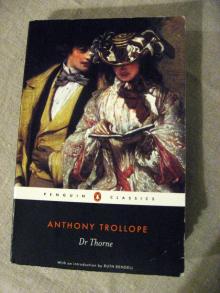 Doctor Thorne
Doctor Thorne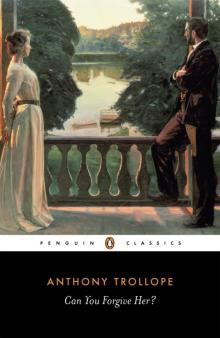 Can You Forgive Her?
Can You Forgive Her?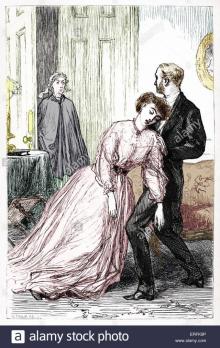 The Last Chronicle of Barset
The Last Chronicle of Barset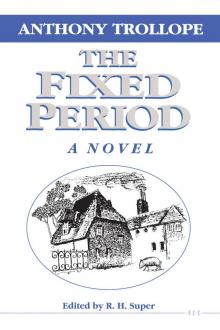 The Fixed Period
The Fixed Period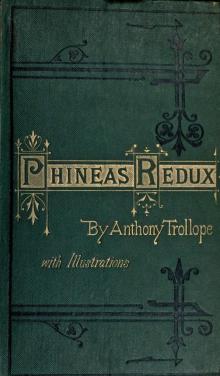 Phineas Redux
Phineas Redux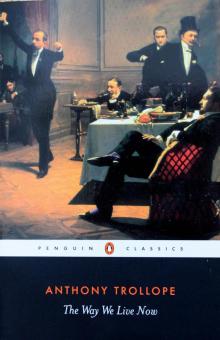 The Way We Live Now
The Way We Live Now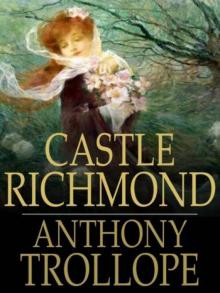 Castle Richmond
Castle Richmond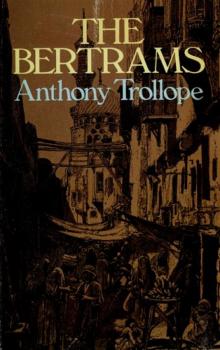 The Bertrams
The Bertrams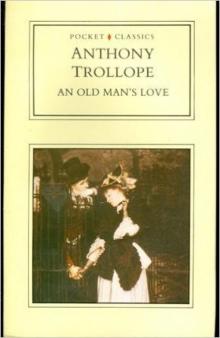 An Old Man's Love
An Old Man's Love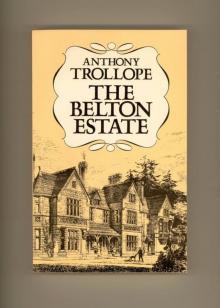 The Belton Estate
The Belton Estate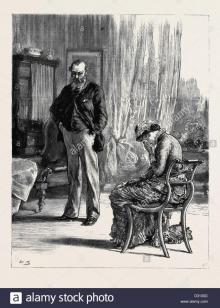 Marion Fay: A Novel
Marion Fay: A Novel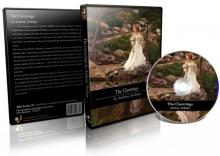 The Claverings
The Claverings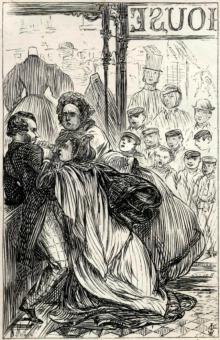 The Struggles of Brown, Jones, and Robinson
The Struggles of Brown, Jones, and Robinson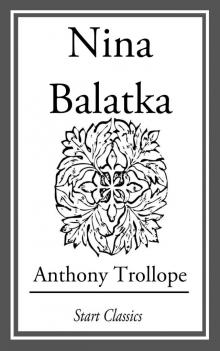 Nina Balatka
Nina Balatka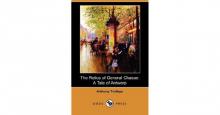 The Relics of General Chasse: A Tale of Antwerp
The Relics of General Chasse: A Tale of Antwerp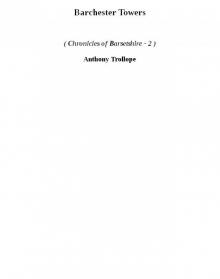 Barchester Towers cob-2
Barchester Towers cob-2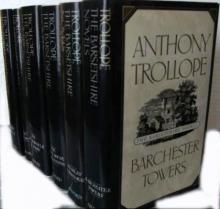 The Chronicles of Barsetshire
The Chronicles of Barsetshire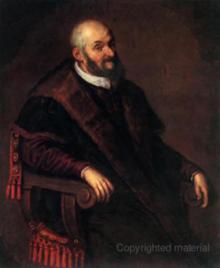 The Warden cob-1
The Warden cob-1 Framley Parsonage
Framley Parsonage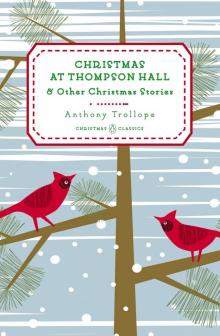 Christmas at Thompson Hall
Christmas at Thompson Hall The Warden
The Warden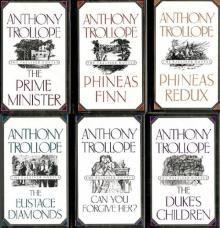 The Palliser Novels
The Palliser Novels The Small House at Allington
The Small House at Allington Barchester Towers
Barchester Towers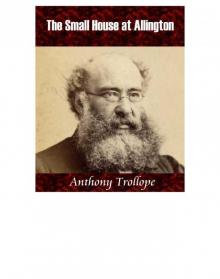 The Small House at Allington cob-5
The Small House at Allington cob-5 The Duke's Children
The Duke's Children Phineas Finn, the Irish Member
Phineas Finn, the Irish Member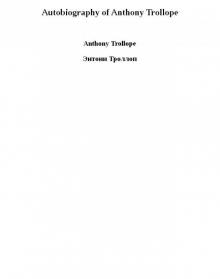 Autobiography of Anthony Trollope
Autobiography of Anthony Trollope